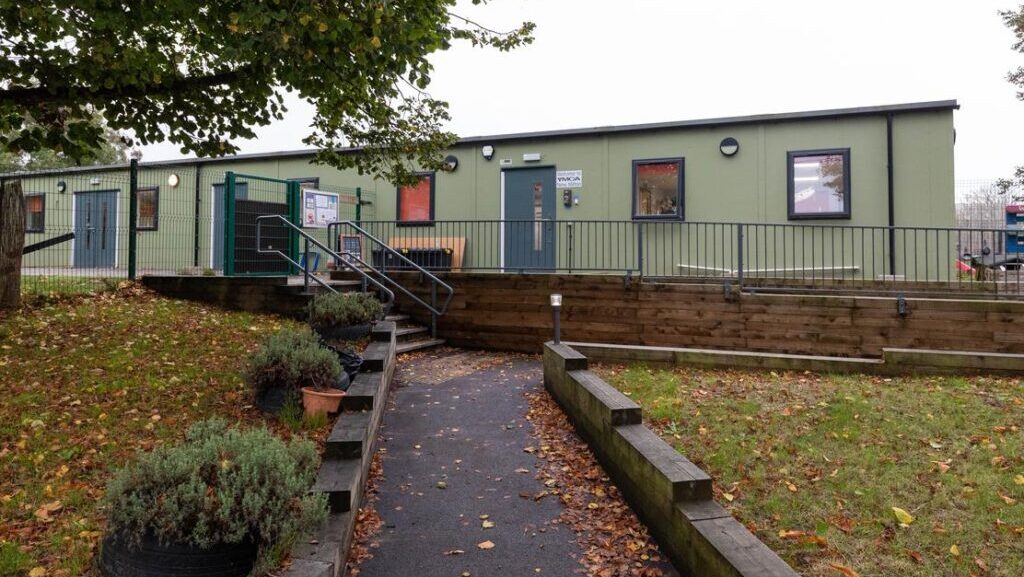East Midlands nursery group Cherubs Nurseries has acquired the former Bingham Day Nursery in Bingham, Nottingham.
Seven benefits to learning in nature
It’s well-documented that being in nature is beneficial to children’s health and wellbeing, but it’s also valuable for learning. Nikki Mallott, head of learning and discovery & research and conservation at Knowsley Safari in Merseyside, outlines seven ways wildlife, nature and the great outdoors can boost children’s educational development.
The great outdoors is perfect for child-led learning
Natural spaces encourage child-led learning, where children are given freedom to decide how they learn. Open fields and dense woodlands have muddy puddles to jump in, bushes to hide inside, sticks to build dens and tree canopies to shelter under – all of which offer a rich landscape for children’s imagination. Add to that the plethora of native wildlife, including ladybirds, beetles and snails, and you have an abundant canvas to feed children’s fascination about the world around them. Watching a moth flapping frantically or a worm slithering through the earth can lead children to mimic the behaviour and this interaction can morph into role-play and further exploration.
Invigorating the senses
Feeling the wind and smelling the rain is invigorating for EYFS children. They’re largely untouched by adults’ dislike of the unpredictable British weather, instead embracing the excitement of water falling from the sky, rumbles of thunder and especially snow. Triggering the senses provokes emotions, so as children stick their tongues out to taste a snowflake, feel rain running down their noses or the warmth of the sun on their faces, they’re instantly awakened, so dish out the puddle suits and wellies and prepare to invigorate their senses – as well as teaching them about the water cycle, clouds and the weather.
A mood boost
Being outdoors boosts serotonin, the happiness chemical which stabilises mood, so when serotonin levels in the brain increase, our mood lightens and we become happier, for adults and children alike. Outdoor play makes young children happier, provoking a positive approach to play and learning, an ideal state for them to absorb a whole variety of subject matter and a willingness to repeat their outdoor experience. After experiencing Knowsley Safari’s Wild and Well programme, there was a 13% rise in the number of children who agreed they liked jumping in puddles and 98% of teachers felt the children were more connected to nature after their visit.
Nature is cross-curricular
Nature and natural resources can be used to bring a range of EYFS areas of learning to life, including literacy, maths, understanding the world and expressive arts and design. For example, children can be inspired by the colours and textures in an outdoor environment, which has relevance to art; counting cobwebs, grouping plants and examining patterns on bugs and butterflies can support maths; while using nature to inspire story telling can tap into literacy and English. Nature can be relied on to bring an array of learning areas to life.
The abundance of animals in nature
Children love animals. Fact. There’s something about furry, wide-eyed, wet-nosed creatures that young people find irresistible, and it all started from day one. As babies develop, they’re naturally attracted to things that move and interact with them, especially if they make interesting noises, are a curious shape or feel good to touch. Children’s connection with animals becomes stronger as they get older and become more familiar with different species and while outdoors there are many native species for children to encounter, from birds and squirrels to voles, moles and mice.
Animals can create excitement, boost confidence and help develop communications skills, as children discuss their traits and behaviours. Using animals in the power of story will see children relate to the animal characters and in turn they’ll find it easier to digest a deeper message.
Confidence and communication
Nature and wildlife can boost children’s confidence and reduce levels of stress. The abundance of natural colours and textures nature offers, has a calming effect making young people more conducive to learning, while aspects of the great outdoors can help children develop speaking and listening skills which can be applied to a variety of topics. Children can talk to a nursery teacher or friend about where rain comes from, how flowers grow or where an animal originates and then relay the same information to a parent or sibling, all confidence boosting communication.
Nature evokes empathy
Taking a class outdoors can help EYFS children develop an awareness of others. Children can realise that they experience similar emotions to those in their peer group, including being frightened if they hear a loud noise or feeling pain if they hurt themselves. This offers reassurance as they realise these are normal feelings. They’ll understand why it’s important to be considerate of others, who will feel the same way in some situations and feel a sense of achievement helping their friends balance on a log, or touch a worm.
Knowsley Safari welcomes hundreds of EYFS children each year, where self-guided tours on the Safari Drive and Foot Safari enable them to learn about animal habitats, native species, seasons and conservation, as well as building confidence and developing social and practical skills.
Latest News
Nursery group First Friends has acquired the YMCA Nursery in New Milton, Hampshire, in a sale facilitated by specialist business…
The Montessori People nursery in Stockton-on-Tees has gained both Investors in People and Investors in Wellbeing awards.




